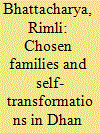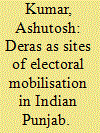| Srl | Item |
| 1 |
ID:
120701


|
|
|
|
|
| Publication |
2013.
|
| Summary/Abstract |
In the Indian subcontinent, the understanding of 'the family' in numerous narrative traditions has always extended into relationships with non-humans, with a pivotal emphasis on the guru-shishya (preceptor-disciple) relationship. This paper focuses on the highly popular English-language 'juvenile fiction' of Dhan Gopal Mukerji to suggest how he reconfigured these narrative traditions for a primarily non-Indian audience in the 1920s-30s. The paper considers Mukerji's young protagonists-invariably male, whether human or animal-in relation to the web of familial and outside social relationships through which the 'quest motif' is played out for a transnational readership. The epic form pervades his 'jungle books' through the figures of the animal protagonists, the search for a leader/guide/guru, and a re-imagining of caste, ethnicity and gender. Of particular interest is the composite mother figure. Dhan Gopal's oeuvre for children maps out a socialisation that is 'free' of the apparatus of the colonial home or of other disciplining institutional sites. Paradoxically, the search to be 'free from fear' can only be played in the alternative topos of the jungle, where violence is inescapable. How, if at all, may these narrative tropes be mapped onto contemporary history?
|
|
|
|
|
|
|
|
|
|
|
|
|
|
|
|
| 2 |
ID:
131613


|
|
|
|
|
| Publication |
2014.
|
| Summary/Abstract |
Mushrooming of the deras in Indian Punjab, and the role of some of these deras in influencing the political choices of their followers, most of whom belong to the socially and economically marginal groups, is being recognised and apparently encouraged by the political parties. This is evident in the fact that political leaders/candidates cutting across party divides flocked to various deras in the run-up to the recent elections. This phenomenon can be attributed primarily to the fact that the social basis of political power of state has remained unaltered in favour of the upper castes/communities. Unwilling to share power, yet compelled to seek the crucial support of numerically strong and economically mobile dalit and other backward castes voters in a closely contested bi-polar polity, the upper-caste political leadership takes recourse to the 'softer' option of cultivating the deras to 'deliver' en bloc the marginal-castes votes. With one form of the identity politics based on ethno-regional communal divide having receded to background, it is the turn of the caste-based identity politics through the 'dera route' that is prevailing in post-militancy Punjab.
|
|
|
|
|
|
|
|
|
|
|
|
|
|
|
|